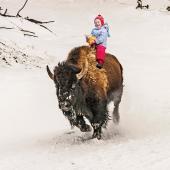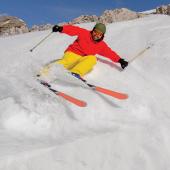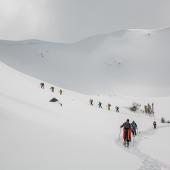Heads Up
Staying safe on the slopes.
This year’s early snows got the powder hounds barking in collective anticipation, and a buzz of excitement spread through town for the season ahead. Now that winter’s here for good, it’s time to talk about mountain etiquette, safety concerns, and injury prevention, specifically avoiding concussions.
Most seasoned skiers and snowboarders adhere to mountain etiquette without even thinking about it. Whenever you start downhill or merge onto a new trail, look uphill and yield to others. Be able to stop abruptly to avoid other people, children, and obstacles. The person in front of you always has the right of way, even if they’re skiing erratically. Don’t duck ropes. We all like the look of untouched powder; however, those ropes and signs exist for your safety.
Ski at your level. If you’re a novice, avoid steep terrain. Conversely, if you’re an expert, speeding by a novice or children in ski school could startle them, causing an accident. Avoid intoxication. Après-ski rituals are a great way to end the day, but you should avoid drinking before hitting the slopes. Lastly, never stop where you can’t be seen.
Even if you’re cautious, accidents still happen. You might catch an edge, snag a tree, or be victimized by another, more reckless skier. Head injuries are of particular concern: for every 10,000 people on the slopes, three people sustain a head injury requiring medical attention. In 30-50% of those injuries, helmets help prevent skull fractures. But they can’t stop concussions.
If you suspect a concussion, stop skiing. Call for ski patrol and allow them to assess you and assist you down the mountain. The symptoms vary from person to person, but headache or migraine, dizziness, nausea, fatigue, imbalance, cognitive trouble, mood swings, sleeping problems, and visual disturbances are all telltale signs.
Once you’re back in town, seek out a trained medical professional. Assuming more serious injuries have been ruled out, such as a skull fracture or hemorrhage, a vestibular physical therapist should evaluate you to determine the type of concussion you’ve suffered and develop a treatment plan to help you return to the slopes as soon as possible. Vestibular therapists treat the inner ear (vestibular system), and are instrumental in appropriately guiding people back to sport and life following head injuries.
This winter, do your best to enjoy what we all hope will be a deep snowpack. Just do yourself and others a favor: look before you leap, and make sure to wear a helmet.
Kelsey Housman is an Emory-certified vestibular physical therapist at APRS in Bozeman.












